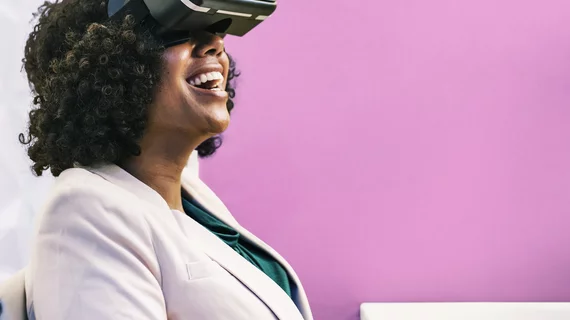Virtual reality able to measure thoracic ultrasound skill
Want to level up your ultrasound abilities? There’s a virtual reality (VR) app for that. Except this isn’t a video game, it’s a real measure of thoracic ultrasound skill.
Researchers from Denmark conducted a study using an ultrasound VR simulator and found the score participants received matched their real-life skill level. The findings were published in Ultrasound in Medicine & Biology. [1]
The researchers, led by Anders Nielsen, MD, from Odense University Hospital, wrote that the VR test enables “standardized, objective, and evidence-based approach to assessment of thoracic ultrasound skills,” signaling that it could be of use in more academic and clinical care settings—and possibly used as a training tool.
Nielsen and his team said previous research has shown VR applications can be useful for teaching, but until now there is a serious lack of data on educational applications for ultrasounds. The researchers developed their test specifically for thoracic ultrasound abilities, utilizing VitaSim—a popular Danish VR education platform—for the simulation.
The study was conducted on clinicians of various skill levels (13 novice, 22 intermediate and 11 considered experienced), utilizing a protocol from the European Respiratory Society to evaluate how well users performed in virtual cases of scanning for pleural effusion and interstitial syndrome.
All participants were given a tutorial on how to properly use the VR. Clinicians were ranked based on how well they performed at tasks such as choosing the right ultrasound wand, scanning the correct area of the patient’s body, and more. In general, experienced operators scored the highest, followed by intermediate, with novice thoracic ultrasound users ranking in the bottom. There were large variations between experienced and intermediate users in some cases, but the ranking order was unaffected.
While the study did not measure how well the VR application would work as a training tool, it ultimately shows the results seen in the simulation line up with the real-life ability of operators. Nielsen and his team noted that future studies are needed to evaluate VR as an educational tool. However, the results show that these applications could be customized for learning. In fact, the test used for this analysis could serve as a model.
“We gathered solid validity evidence, determined that the test can discriminate between experienced and inexperienced ultrasound operators and established a credible pass/fail score,” the authors wrote. “This standardized portable test could be a prerequisite in a structured simulation-based mastery learning program.”
Read the full study at the link below.

